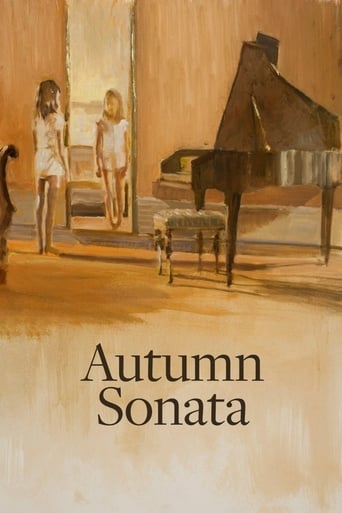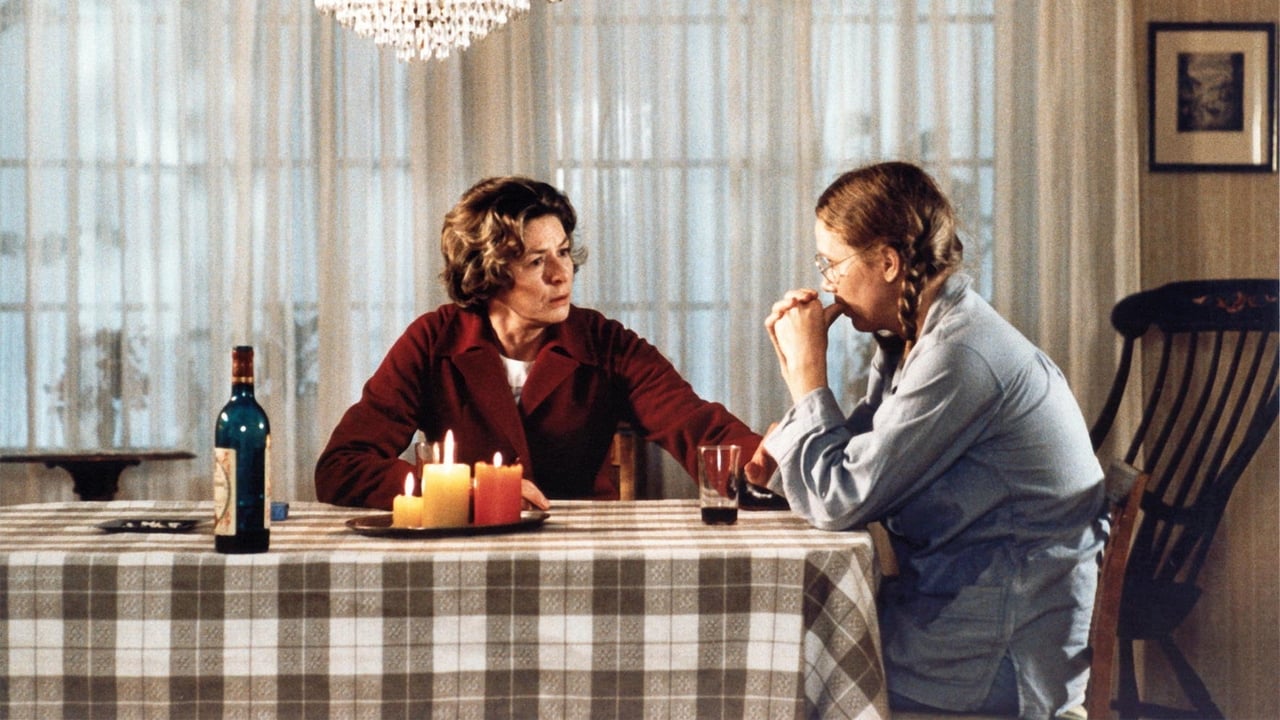Lee Eisenberg
Two giants of Swedish cinema - with names different by only three letters - finally collaborated with Ingmar Bergman's "Höstsonaten" ("Autumn Sonata" in English). Ingrid Bergman plays Charlotte, the mother who abandoned her family to pursue a career. Returning home forces her and her daughter Eva (Liv Ullmann) to reconcile while at the same time facing problems that their family has had.Film buffs know that Ingmar Bergman is one director who doesn't insult his audience's intelligence. With this movie he goes deep into the issues that have dominated this family, and how they're bound to play out. I haven't seen most of Bergman's movies, so I can't compare this to them, but I can say that it's one of the most profound and complex stories ever put to film. Maybe not the greatest movie ever made, but still one that you should see.
Raymond
I catch a Bergman movie anytime I can, I've loved all I've seen so far (Jungfrukällan, Nattvardsgästerna, Vargtimmen, Det Sjunde Inseglet). This - even tho good - was maybe the least favorite so far.I had zero knowledge of this movie before seeing it, a perfect way to see a movie, I only knew it was a Bergman movie which of course sets a certain expectation.The acting is quite good. I was quite impressed by Ingrid Bergmans performance (it actually took me a while to figure out it was her). Ullman's performance in my opinion is a bit over the top and she doesn't quite fit the role. She felt like a warm and kind loving wife rather than a woman not capable of loving due to unhappy childhood. I didn't find her believable in the role she was put in. She looked way too content with herself for a woman holding so much anger, sadness and suppressed feelings. Her performance has been praised, but even the key scene when she looks at her mother play the piano felt somehow awkward to me. Maybe I need to watch the movie again.Since I knew nothing about the movie beforehand, I felt at times that the movie took quite drastic turns. I don't know if it was structured as well as it could've been. Things came out unexpectedly - which may have been intentional also.I also wasn't too sure that the sick sister was a necessary character here. The scenes with her are quite sparse and she's left undeveloped as a character and her part in the whole was left a bit of a mystery. I also wasn't sure why it was implied that her sickness was caused by her mothers actions, that felt quite far fetched since her condition was clearly not (only) psychological, but rather neurological.The whole movie was a bit like watching a train wreck, it's not exactly fun watching tormented characters. Which leaves me to think what the purpose of this movie was. It's nevertheless a strong drama, but it left me mostly just feeling sad. I don't know if it would be wise to see this movie again and look for symbolic stuff that I've found in Bergmans other movies, they've felt deeper and more meaningful than this. I was left wondering if the fact that Ullmann's characters son died by drowning carried a more deeper meaning, because it was revealed at a certain point in the movie. Maybe I was just overwhelmed by the drama and couldn't see deeper, but I didn't find a true meaning in this movie, other than purification of some sort.
PassPopcorn
You should have a taste for heavy, depressing, complicated dramas in order to like Ingmar Bergman's opus – and I don't think many people do. This isn't Bergman's most famous or most experimental movie (the most popular are Persona, Wild Strawberries and The Seventh Seal), but it's still very good. It has the classic Bergman set-up: a few people are put in a small environment and are forced to confront each other. I found quite charming the fact that the colors in the movie are all autumnal, which fits the title perfectly.After the death of her long time friend and partner, Charlotte (Ingrid Bergman) accepts the invitation of her daughter Eva (Liv Ullmann) and her husband Viktor (Halvar Björk) to come and stay with them a while. On her arrival, she's unpleasantly surprised to find her other daughter Helena (Lena Nyman) there as well, since she had sent her to a hospital because she's mentally disabled. Charlotte hasn't seen Eva in years because she's always touring, as she's a world famous pianist, and after the joy of seeing each other wears off, one night the two women start recalling Eva's childhood and, in a heated fight, manage to finally tell each other what they always wanted to say.Autumn Sonata deals with the negative consequences on a child's later life, caused by the fact that a parent is too concentrated on his/her career and therefore is ignoring his/her child. Interestingly, this was a well known issue for Ingrid Bergman, who had become famous for leaving her family and running away with Italian director Roberto Rossellini. But it was also not an unknown theme for Ingmar Bergman who, according to one of his sons, "hadn't been a father at all". Regardless, it's a difficult theme and the movie tries to explore all its implications: therefore it is mostly made of dialogue, which can become boring if the movie doesn't grip you. But I think it's very difficult not to get emotionally involved in the story, especially since relationships between parents and children are rarely simple.Because of so much dialogue and because it is mostly set in Eva's house, Autumn Sonata reminds of theatre, which is where Bergman started his career. Also, all the characters apart from Charlotte and Eva are not that relevant and they only help define the mother-daughter relationship better. Liv Ullmann and Ingrid Bergman deliver great performances. Every detail is carefully planned, like for example their external appearance: Eva wants to go unnoticed in her dull colored clothes, tied hair and huge glasses, while her mother is elegant, beautiful and self-confident. And even though this changes after their night-long discussion, we get the impression that the message of this movie is – things never change, especially when they become routine, no matter how much we (think we) want them to change. Nonetheless, Autumn Sonata is a beautiful and intelligent movie, and a definite recommendation.Rating: 8/10 Read more at http://passpopcorn.wordpress.com/
Sindre Kaspersen
Swedish screenwriter, playwright, producer and director Ingmar Bergman's 39th feature film which he wrote, is a West-Germany production which premiered in Stockholm, Sweden. It was shot at a film studio in Oslo, Norway during the period when the director was in exile due to his conflicts with the Swedish Government, and produced by American producer Richard Brick, Russian-born English film producer Lew Grade (1906-1998), Austrian-born Swedish film producer Katinka Faragó and American film producer Martin Starger. It tells the story about Charlotte Andergast, a world renowned concert pianist who after seven years abroad visits her daughter Eva who lives on the countryside with her husband Victor who is a preacher and her multi-disabled sister Helena who Eva brought home from the institution her mother had placed her in after abandoning them to pursue her career.Distinctly and precisely directed by filmmaker Ingmar Bergman, this condensed and finely paced psychological character-piece draws an incisive portrayal of a materialistic artist's afflicting relationship with the daughter she has neglected for many years and her struggle to redeem herself and gain her religious daughter's forgiveness. While notable for it's naturalistic milieu depictions, prominent set design by production designer Anna Asp, cinematography by cinematographer Sven Nykvist (1922-2006), costume design by Swedish costume designer Inger Pehrsson and use of music, this dialog-driven, existentialistic and humane chamber-piece depicts two converging and deeply internal studies of character.This atmospheric, straightforward and concentrated story about a heart- to-heart conversation during one autumn night between a reunited daughter and mother, is impelled and reinforced by it's emotional depth, substantial character-development, riveting dialog, cogent narrative structure, the profound acting performances by Norwegian actress Liv Ullmann, Swedish actress Ingrid Bergman (1915-1982) in her next to last acting role and the fine supporting acting performances by Swedish actor Halvar Björk (1928-2000) and Swedish actress Lena Nyman (1944-2011). A consistently involving and masterful melodrama which gained, among other awards, the NSFC Award for Best Actress Ingrid Bergman at the 13th National Society of Film Critics Awards in 197 and the NBR Award for Best Director Ingmar Bergman at the 50th National Board of Review Awards in 1978.


 AD
AD





